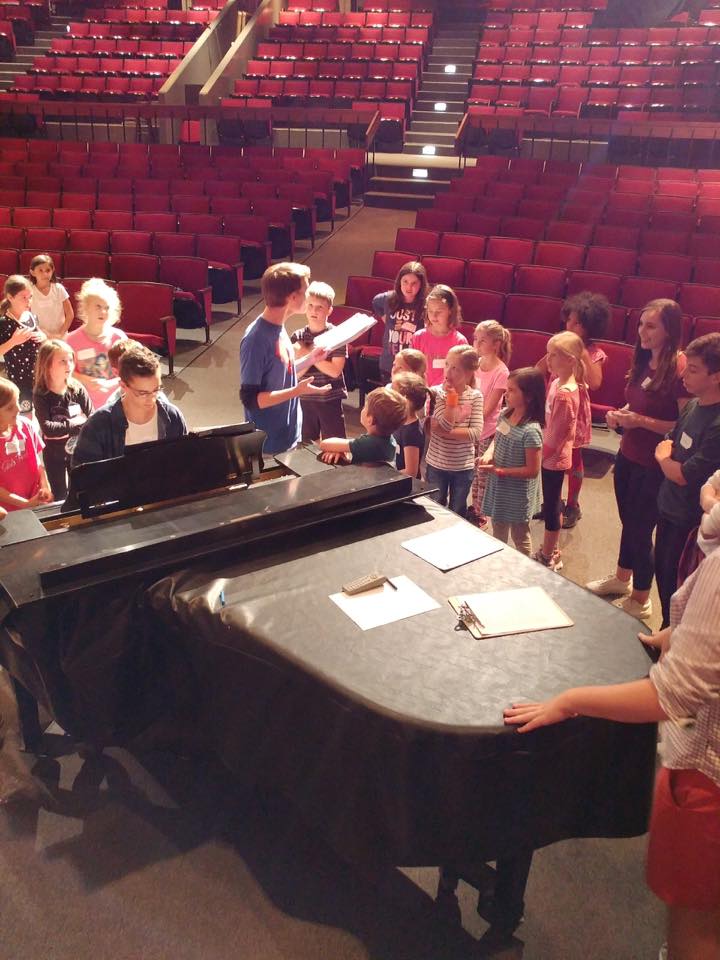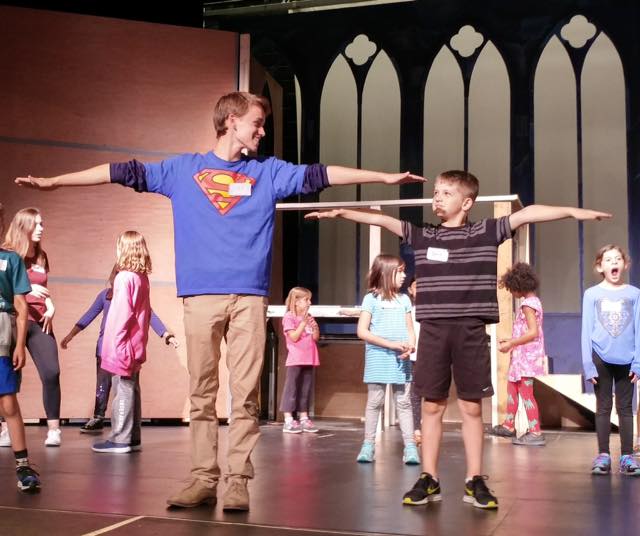Children’s workshops are a great way to get district families excited about your shows and program while raising the funds you need to sustain your programming. Most fundraisers tend to make financial asks of the parents and guardians of your current students, and this allows you to find a new source of funding while raising the stature of your program, recruiting future artists, and advertising your upcoming productions. We started our children’s workshops in 2016, and this is what has worked for us. We’d love to hear what works for other schools if you offer workshops!

For each show in our season, we offer a children’s workshop for all students in grades 2-8. Each workshop is specifically connected to our upcoming show to build hype. We first piloted this for “Beauty and the Beast,” so the workshop taught the students how to sing and dance an excerpt from “Be Our Guest.” Our children’s workshops are so popular, we now are running three simultaneous workshop tracks to increase capacity. For our upcoming musical “The Hunchback of Notre Dame,” the workshop tracks are:
- Musical Theatre Performance. Experience what it is like to perform in PC by learning how to sing and dance the song “Topsy Turvy” from our upcoming musical.
- Technical Theatre. Experience backstage as you explore the design and creation techniques in hair and makeup, lighting, and sound.
- Playing a Soldier: Captain Phoebus. Experience what it is like to perform in PC by learning all about performing as Captain Phoebus in “Rest and Recreation” from our upcoming musical.
In each workshop track, we split the groups by age depending on our enrollment numbers: grades 2-5 and grades 6-8 are ideal. This makes 6 classes of 15 students, and we cap at a maximum total of 90 participants (although we do not typically sell out the technical theatre class, we feel strongly this is a very important workshop to offer, and if our performance classes sell out, this is a great alternative and you never know when it will spark an interest!).
Each class is assigned two high school group counselors, who are the leaders of that class. The group counselor’s responsibilities include taking students to the bathroom, being exemplary participants in each workshop, and encouraging students who need more support. To help keep our classes organized, when students arrive, we give each student a color-coded name tag. So then we know that grades 2-5 in musical theatre are all blue, while grades 6-8 technical theatre are all red.
So let’s break down how the schedule works:
6:00-6:30 Behind-the-Scenes Tours
6:30-7:15 Workshop 1
7:15-7:30 Snack
7:30-8:15 Workshop 2
8:15-8:30 Wrap-up
To start the evening, our group counselors lead their class on a behind-the-scenes tour of our space and the show. Each group starts in a different location with a specific path that rotates through (preventing groups from being in the same space at the same time). The tour includes our whatever shape our set is in along with the scenic design drawings, the wings and backstage areas, and our classroom space. We take a stop at the light booth, where we allow students to each press the “go” button to change a lighting cue (and encourage them to learn more about the light board at future technical theatre workshops). Students love seeing costumes and props, even as works in progress, so we ask our costumes and props team to each pick out one or two items that the students can handle and touch, and to put their favorite or most complete costume on a mannequin to display. After the tour, the group counselors will lead their students to their first workshop.
In each workshop track, there are two workshop sessions a class will attend. For “Musical Theatre,” they will attend a dance workshop and a music workshop. For “Technical Theatre,” they will attend a light and sound workshop, and a hair and makeup workshop. For “Playing a Soldier,” they will attend a dance workshop and a music workshop. Here’s is what that schedule looks like:
|
MUSICAL THEATRE
|
6:30-7:15
|
7:30-8:15
|
|
Music
|
Grades 2-5 (red)
|
Grades 6-8 (blue)
|
|
Dance
|
Grades 6-8 (blue)
|
Grades 2-5 (red)
|
|
TECHNICAL THEATRE
|
6:30-7:15
|
7:30-8:15
|
|
Lights and Sound
|
Grades 2-5 (green)
|
Grades 6-8 (purple)
|
|
Hair and Makeup
|
Grades 6-8 (purple)
|
Grades 2-5 (green)
|
|
PLAYING A SOLDIER
|
6:30-7:15
|
7:30-8:15
|
|
Music
|
Grades 2-5 (orange)
|
Grades 6-8 (black)
|
|
Dance
|
Grades 6-8 (black)
|
Grades 2-5 (orange)
|
Each workshop is led by two high school thespians. With two workshop leaders and two group counselors, there are now four high school thespians for fifteen students in the class. We also like to have six parent volunteers, which is one parent volunteer to stay in each workshop space for extra safety (because I cannot be everywhere at once!). Sometimes we have more high school students interested in participating as leaders, so we can assign extra high school students to be role models in each workshop.
Our “Playing a Soldier” workshop is geared to boys+ and is lead by the men+ in our program so that they can be role models and our younger students can see themselves in our program in the future. This is a great way to help with diversity in your program! We try to always include a workshop exploring a male-gendered character, but do not label this as a workshop for boys+ as we want to be inclusive.

For , we buy individual packs of goldfish or pretzels and the small half-bottles of water, and voila, that’s done! Once we have finished snack, we are on to workshop session two. After workshop session two, everyone comes back to the theatre for . Our wrap-up is always a big circle on stage. We ask every student to think of one thing they learned today, and once they have thought of an answer to touch their nose (give students time to pre-think of an answer, or else you will not be able to get through 90 students in 15 minutes). We go around the circle to share, thank our high school leaders, and then, since parents are now ready to pick up their students, we ask our performance workshops in they want to perform what they learned with their high school leaders (they have never said no!). If possible, see if you can have the characters from the song they are learning at the workshop because it gives the students extra excitement. For example, in “Being a Soldier,” the students will get to perform with the actor playing Phoebus for “Rest and Recreation”, and when we did “Be Our Guest,” they performed with the actors playing Lumiere and Belle.
So how do we actually get the children’s workshop off its feet? To get the word out about this programming, we send flyers home through the elementary schools, post on social media, reach out to local children’s theatres and dance studios, and encourage our students who have siblings or babysit to spread the word. We have registration using the same online ticketing platform we use for our shows (we love the ticketing platform Universe because they have non-profit pricing and we can have tons of check-out questions). To direct folks straight to registration, we include a QR code and registration information on everything we distribute.
As we use the same structure for each children’s workshop, prepping is easy. Once we decide on the workshop topics for each show, we take volunteers for each position. Then, our student workshop leaders work together to create a lesson plan and pitch it a short meeting where they receive feedback. Because they work as partners to create one 45-minute lesson, you’ll be amazed at how little coaching they will actually need on that lesson plan. Now that we have done the children’s workshops a few times, our only time spent on this event is the one planning meeting to pitch lesson plans, buying the snack, and then the event itself. We charge $25 per student, and we typically have a profit margin of $1500-$2000 for the evening. We started with 30 participants at $20 each for a profit margin of $550 and we were so happy with that! As a bonus, we also gift a ticket or offer a discount to the students so they see our show. This gives us even more profit as the parents and families are now buying tickets, too, and they can turn into word-of-mouth machines within their elementary communities.
To help us continue the children’s workshop programming, I ask a student or two to volunteer as a photographer or videographer for the event so we can then have great marketing for the next workshop. If we have a videographer, they create a short 2-3 minute video we send out to the families a week or so after the event. Word to the wise: if you want to post the pictures on social media, add a check-out question on registration that gives permission to post their photo publically.
While this works for us, there might be other ways that will work best for your district. Are there other ways you have found to successfully engage your elementary and middle school thespians? I’d love to hear them!